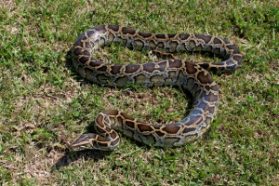Snake blood boosts mouse heart
Scientists find that a mouse’s heart swells in the presence of python blood
Maybe you think you know what happens when a mouse meets a python, but scientists recently presented a surprising twist on the typical snake-meets-mouse tale.
They found that three substances in the blood of a Burmese python cause a mouse’s heart to grow larger (though probably not fonder). When lab mice received injections of these substances, called fatty acids, their hearts grew heavier by 10 percent in a week. The larger hearts looked healthy, as though the mice had been exercising more, the scientists said.

“We used the extreme biology of a snake to create a beneficial type of cardiac enlargement in mammals,” Leslie A. Leinwand told Science News. Leinwand, a biologist at the University of Colorado Boulder who studies how heart tissue develops, led the study.
A python doesn’t dine very often. In fact, the snakes can go months between meals. But when it does dine, it devours its meal whole. To help break down the food and deliver nutrients to the body, a python’s heart and other organs grow larger for two or three days after dinner. This reaction doesn’t happen in mice, which eat small meals and snack constantly. Their hearts don’t need to accommodate gluttonous feasts, so they stay the same size.
Leinwand, who knew about the growth spurts in python hearts, started studying the giant snakes in 2005. She brought in other scientists to work with her in the lab, including biologist Cecilia Riquelme, who was terrified of the animals. Riquelme didn’t let her fear stop her, though, and in one experiment she added bits of snake blood to mouse heart cells. To her surprise, and the surprise of Leinwand, the cells grew.
“I don’t know whether I literally jumped up and down,” Leinwand told Science News, but she was excited.
Blood, in humans as in pythons, contains a mixture of chemical compounds and substances. Leinwand and her team, along with scientists from the University of Alabama Tuscaloosa, wanted to know which of those compounds caused the heart cells to grow. After many experiments, they identified the three fatty acids responsible. These acids, called myristic, palmitic and palmitoleic, show up in humans and snakes, as well as in other animals. The scientists found the right blend of fatty acids that spur heart growth, but they don’t know how it works.
Leinwand hopes that part of the research might lead to treating human hearts. A heart is made of cardiac muscle, and like any muscle, it grows larger and stronger through exercise. However, an enlarged heart can also be a sign of poor health: Hearts grow larger because of high blood pressure or heart attacks. Leinwand told Science News that knowing whether python blood could help humans “will take a very long time.”
Scientists already knew that when you put a mouse in a python, the snake’s heart grows larger. Leinwand and her team have shown the reverse is true, too: Put (part of) a snake in a mouse, and the mouse’s heart swells.
But it’s not love; it’s science.
POWER WORDS (adapted from the New Oxford American Dictionary)
cardiac Relating to the heart.
fatty acid Large molecules made of up chains of carbon and hydrogen atoms linked together.
biology The study of life and living things.
python A large, heavy-bodied nonpoisonous snake that lives in the tropics. Pythons are constrictors, which means they squeeze their prey before devouring them whole.







